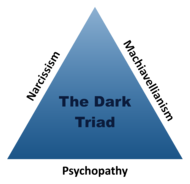| Machiavellianism | |
|---|---|
 | |
| Machiavellianism is one of the traits in the dark triad model, along with psychopathy and narcissism. | |
| Specialty | Personality psychology |
| Causes | Genetics and upbringing[1][2] |
In the field of personality psychology, Machiavellianism (sometimes abbreviated as MACH) is the name of a personality trait construct characterized by interpersonal manipulation, indifference to morality, lack of empathy, and a calculated focus on self-interest.[3][4][5][6] Psychologists Richard Christie and Florence L. Geis created the construct and named it after Niccolò Machiavelli, as they used truncated and edited statements similar to his writing style to study variations in human behaviors.[7][8][9] The construct's relation to the thinker himself is exclusively nominal.[10] Their Mach IV test, a 20-question, Likert-scale personality survey, became the standard self-assessment tool and scale of the Machiavellianism construct. Those who score high on the scale (High Machs) are more likely to have a high level of manipulativeness, deceitfulness and a cynical, unemotional temperament.[11][12]
It is one of the dark triad traits, along with the subclinical versions of narcissism and psychopathy.[13][14][15]
- ^ Vernon, Philip A.; Villani, Vanessa C.; Vickers, Leanne C.; Harris, Julie Aitken (January 2008). "A behavioral genetic investigation of the Dark Triad and the Big 5". Personality and Individual Differences. 44 (2): 445–452. doi:10.1016/j.paid.2007.09.007.
- ^ Cite error: The named reference
Schermer-2020was invoked but never defined (see the help page). - ^ Geis, Florence; Christie, Richard; Nelson, Carnot (1970). "In Search of the Machiavel". Studies in Machiavellianism. p. 76. doi:10.1016/B978-0-12-174450-2.50010-5. ISBN 978-0-12-174450-2.
- ^ Jones, Daniel N.; Paulhus, Delroy L. (2009). "Machiavellianism". In Leary, Mark R.; Hoyle, Rick H. (eds.). Handbook of Individual Differences in Social Behavior. Guilford Press. pp. 93–108. ISBN 978-1-59385-647-2.
- ^ In sum, the key elements of Machiavellianism appear to be (a) manipulativeness, (b) callous affect, and (c) a strategic-calculating orientation.
- Jones, D. N., & Paulhus, D. L. (2014). Introducing the short dark triad (SD3) a brief measure of dark personality traits. Assessment, 21(1), 28-41.
- ^ Machiavellianism is a trait defined by manipulative, callous and strategic dispositions.
- Jones, D. N., & Figueredo, A. J. (2013). The core of darkness: Uncovering the heart of the Dark Triad. European Journal of Personality, 27(6), 521-531.
- Furnham, A., & Treglown, L. (2021). The dark side of high-fliers: the dark triad, high-flier traits, engagement, and subjective success. Frontiers in Psychology, 12, 647676.
- ^ Christie & Geis 1970, p. 10, 339.
- ^ Colman, Andrew M. (2015). "Machiavellianism". A Dictionary of Psychology. Oxford University Press. p. 434. ISBN 978-0-19-965768-1.
- ^ Rauthmann, John F.; Will, Theresa (30 April 2011). "Proposing a Multidimensional Machiavellianism Conceptualization". Social Behavior and Personality. 39 (3): 391–403. doi:10.2224/sbp.2011.39.3.391.
- ^ Cohen, A. Counterproductive Work Behaviors pg. 121
- ^ Spielberger & Butcher 2013.
- ^ Geis, F. L. (1978). "Machiavellianism". In London, Harvey; Exner, John E. (eds.). Dimensions of Personality. Wiley. pp. 305–363. ISBN 978-0-471-54392-3.
- ^ Paulhus, Delroy L; Williams, Kevin M (December 2002). "The Dark Triad of personality: Narcissism, Machiavellianism, and psychopathy". Journal of Research in Personality. 36 (6): 556–563. doi:10.1016/S0092-6566(02)00505-6. S2CID 6535576.
- ^ Lyons 2019, p. 2.
- ^ Furnham, Adrian; Richards, Steven C.; Paulhus, Delroy L. (March 2013). "The Dark Triad of Personality: A 10 Year Review". Social and Personality Psychology Compass. 7 (3): 199–216. doi:10.1111/spc3.12018.